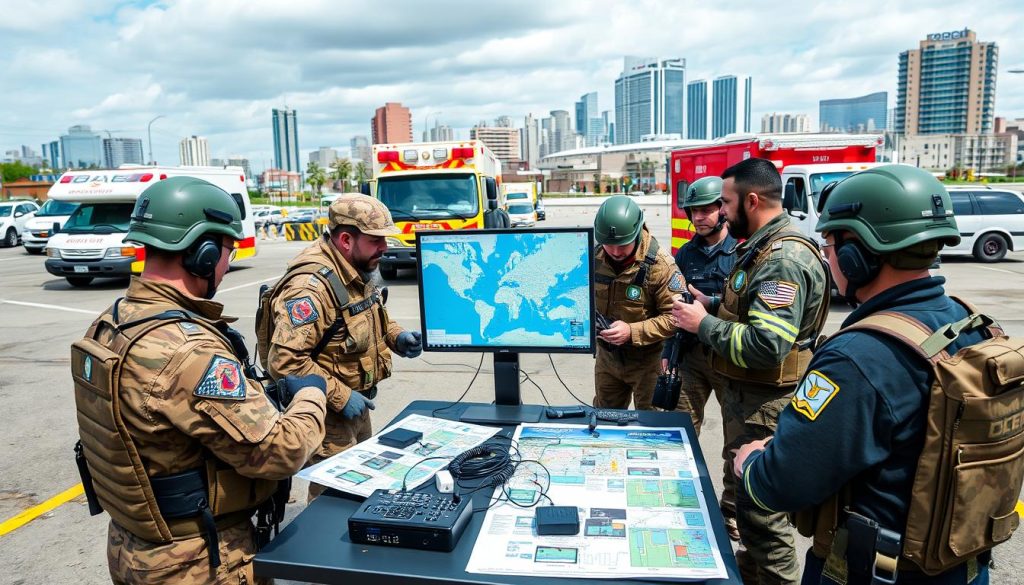The CEM (Certified Emergency Manager) Test is the top certification for emergency management pros in the US. Passing it shows you’re skilled in emergency operations, hazard mitigation, and crisis response. This guide will get you ready for the CEM test. It will help you learn what you need to know to do well and move up in your career.

To get the Certified Emergency Manager (CEM) certification, you need to know the exam well. It’s about understanding the exam’s structure and format. Also, having a deep grasp of emergency management’s key areas is crucial.
The CEM test has 100 multiple-choice questions. It checks your skills in emergency planning, incident command, hazard mitigation, risk analysis, and simulation exercises. Knowing the exam’s layout helps you study better.
The CEM test covers many important areas of emergency management. These include:
Mastering these key areas helps you get ready for the CEM test. It also prepares you to lead in emergency management.
| Key Knowledge Domain | Description |
|---|---|
| Emergency Operations Planning | Expertise in developing comprehensive emergency plans that address all phases of the disaster management cycle. |
| Incident Command System Mastery | Understanding the principles and application of the Incident Command System (ICS) in coordinating emergency response efforts. |
| Hazard Mitigation Proficiency | Deep understanding of risk assessment, hazard identification, and the implementation of mitigation strategies to reduce the impact of disasters. |
| Risk Analysis Proficiency | Ability to conduct thorough risk analyses, including vulnerability assessments and impact evaluations, to inform emergency management decision-making. |
| Emergency Simulation Exercises | Skills and knowledge required to design, implement, and evaluate emergency simulation exercises that test the effectiveness of emergency plans and response capabilities. |
To pass the CEM (Certified Emergency Manager) Test, you need a solid study plan. Use textbooks, online courses, and workshops on crisis response training, emergency management certification, hazard mitigation assessment, risk mitigation assessment, and business continuity planning expertise.
First, learn what the exam covers, like emergency planning and risk assessment. Spend more time on areas you’re not sure about. Use textbooks, publications, and online resources to learn these key topics.
It’s also important to practice with tests and simulations. Use practice tests that are like the real CEM exam. These help you check your knowledge and improve your skills in emergency situations.
| Resource | Description |
|---|---|
| FEMA Independent Study Courses | A comprehensive collection of online courses covering various aspects of emergency management, including incident command, hazard analysis, and disaster recovery. |
| IAEM CEM Practice Exams | The International Association of Emergency Managers (IAEM) offers practice exams that closely resemble the actual CEM test, allowing you to gauge your readiness. |
| Emergency Management Workshops | Attend hands-on workshops and simulations facilitated by experienced emergency management professionals to enhance your practical skills. |
With these study tips and resources, you’ll be ready to show your skills in emergency management. This will help you get your CEM certification.
To do well in the CEM (Certified Emergency Manager) Test, you need to show you’re good at several important things. The exam checks if you know about emergency operations credentials, crisis response qualifications, incident command qualifications, risk management expertise, and emergency planning credentials.
Being great at these areas will help you feel more confident during the exam. It also shows you’re ready to handle many emergency management tasks. Learning about emergency operations, crisis response, incident command, risk management, and emergency planning is key. This knowledge prepares you for the many challenges emergency managers face.
Spending time and effort on these areas is crucial. It makes sure you can show off your emergency management skills. With a solid base in these subjects, you’ll be ready to use your knowledge and skills in real emergencies. This makes you a very valuable person to any team.